In this post, the team at Property Solvers Auctions highlights over 61 books on property development.
The titles covered include planning applications / law, architectural standards, commercial / industrial to residential conversions, building regulations, development finance + economics, eco + green building, construction management, older property refurbishment alongside a range of other theoretical and practical aspects of development.
Be sure to also check out our property investment + auction book lists and property podcasts summary post.
Enjoy!
The Housebuilder's Bible 14: 14th Edition
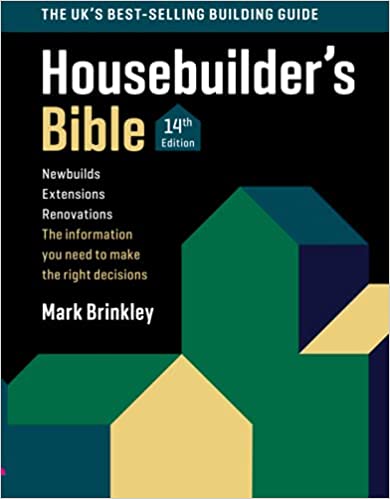

4.4 out of 5 (797 ratings)
Created by prolific and highly experienced house building specialist Mark Brinkley, this publication is hailed as the UK’s best selling house building guide – having sold over 200,000 copies.
Now in its 14th edition, the book is a practical, accessible and highly valuable reference for house builders of all backgrounds and levels, from “DIY-ers” to architects, contractors and surveyors.
Along with presenting handy case studies, the publication guides the reader step-by-step through a build, covering the following areas:
- Understanding the “model” house
- Recognising potential pitfalls
- Effective approaches to design
- Project management methods
- Tackling the groundworks
- Moving on to the superstructure
- Heating, powering and connecting-up a property
- Finishing
Property Development: Discover the secrets to becoming a property developer, from scratch, using none of your own money
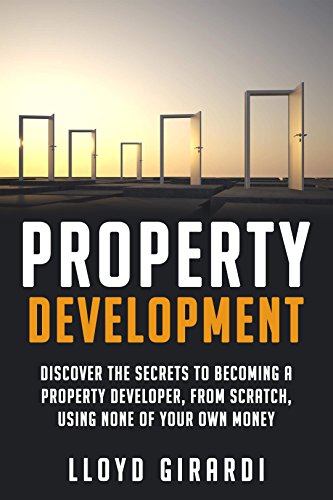

4.6 out of 5 (201 ratings)
Influential property developer Lloyd Girardi draws on his own extensive experience in sourcing sites and developing property to put together this exceptional 2018 guide to running well-planned, intelligent and profitable business.
The book advises would-be developers and investors on every step of the process, from start to completion. Readers will learn:
- The best ways to launch a property development business
- A range of organisational structuring options
- Finding sites (direct to vendor, auctions, networking etc.)
- About all kinds of potential sources of capital
- Approaches to building the best possible team
- Refinancing techniques
- Numerous property “secrets” that will give them the edge against competitors
The Birth of a Building: From Conception to Delivery
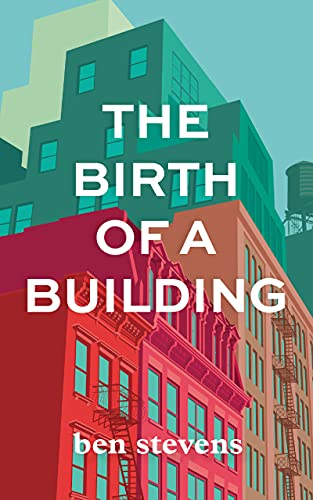

4.7 out of 5 (128 ratings)
Project manager and specialist in Urban Land Economics Ben Stevens introduces readers to the life of a building project, from the initial planning stages right through to completion.
Published in 2021, the book offers a superb insight into the process of designing, developing and constructing a building, and offers a wide range of learning outcomes that are suitable for anyone interested in architecture and real estate development.
These learning outcomes include:
- A detailed exploration of why people build
- An exploration of the various stages of a building project
- Analogies from life to aid in the reader’s understanding of every process
- Interdisciplinary insights that are applicable to a range of fields
The Housebuilding Handbook: Your pocket guide to building a low risk, high reward property development business on a solid foundation
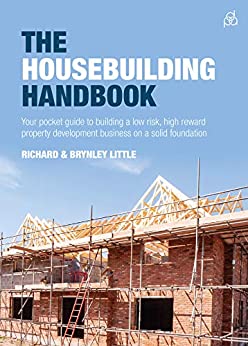

4.1 out of 5 (89 ratings)
This hugely handy “pocket guide” does just what it says on the cover, offering a condensed, step by step “handbook” covering everything you need to know about property development in an actionable format.
Published in 2019 by Richard Little and Brynley Little, the book guides current and future property developers through a range of processes, setting them on the path to success. The Housebuilding Handbook teaches readers:
- How to avoid the most common property development mistakes
- Ways to identify and bag the best deals
- Strategies to ensure the best return and to mitigate risk
- Methods of weathering economic crises
- Techniques for building a property development company that will last
The Book on Flipping Houses: How to Buy, Rehab, and Resell Residential Properties (Fix-and-Flip, 1)
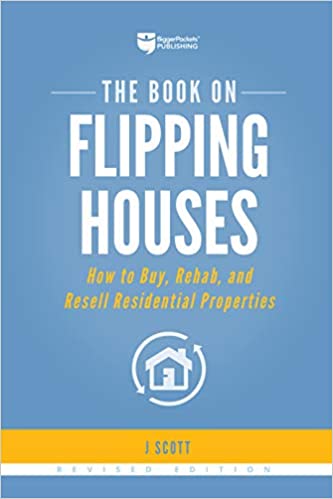

4.7 out of 5 (1,397 ratings)
Ex-Silicon Valley manager and real estate investor J Scott’s comprehensive 2022 guide on the practice of flipping houses offers engaging and easy-to-follow advice that promises to aid the reader in their quest to leave their 9-5 and grow their wealth independently in property.
Applicable in almost any economic context, the book provides actionable advice on the following subjects and more:
- Common strategies used to finance property “flips” and how to use them
- Property buying strategies;
- How to assess potential profits and losses when analysing a deal
- Deciding which properties will make the best investments
- Undertaking due diligence
- Picking the right locations
- Balancing your projects, business and budget for ongoing profit
- Selecting the right contractors
- Selling fast for the best price
Building Construction Illustrated
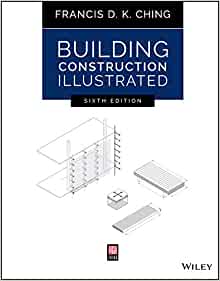

4.7 out of 5 (864 ratings)
An up to date sixth edition of a 40-year-old seminal text in the world of building construction, this publication by Francis D.K. Ching is a vital addition to any developer’s bookshelf.
Suitable for any reader, from first-year students to practising professionals, Building Construction Illustrated provides clear, accessible and detailed guidance on all matters related to the design and creation of buildings, including up to date regulations and codes.
The book includes introductions to – and explorations of:
- The site itself
- Planning a building
- Foundations
- Flooring
- Walls
- Roofs
- Insulation and the prevention of damp and condensation
- Doors
- Windows
- Finishes
- Services
- Materials
The Builder's Companion, Book 1: Zero to Planning Permission, UK/Ireland Edition, Your Complete Guide to Home Building
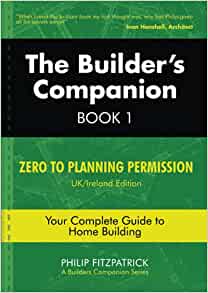

4.4 out of 5 (57 ratings)
Veteran building surveyor Philip Fitzpatrick offers vital insights into the various stages of a project in this hugely practical and highly accessible series of books.
Fitzpatrick takes the reader from the very beginning of a project right through to the receipt of planning permission in Book 1, drawing on his own extensive experience throughout.
A “straight talking” publication, first taken to print in 2021, the book covers topics such as:
- How to work with building designers
- Legalities involved in building and property developing
- Zoning
- Compliance with planning regulations
- Green tech in the construction world
- Budgeting for your build
The Builder's Companion, Book 2: Start Building to Completion Certificate, UK/Ireland Edition, Manage and Build Your Home
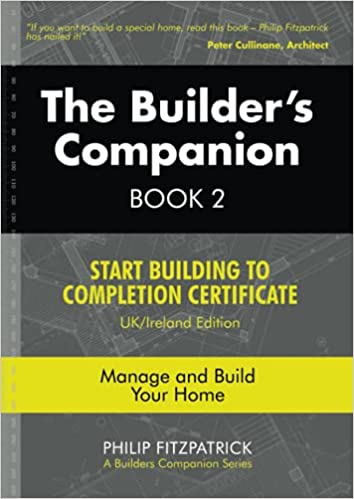

4.4 out of 5 (43 ratings)
This is book 2 in Philip Fitzpatrick’s Builder’s Companion series – the first volume of which is included in this list just above.
The 2021 publication builds on the fundamental knowledge gained by readers in book 1, and guides the developer further along the process of building a property.
The Builder’s Companion, Book 2 covers topics such as:
- Ways to make your design unique
- How to build something that is environmentally sustainable
- Approaches to effective site management
- The importance of quality
- Ways to recognise a good deal
Barry's Introduction to Construction of Buildings
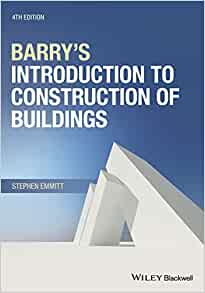

4.6 out of 5 (64 ratings)
Stephen Emmitt, academic and specialist in architectural management and architectural technology, created this 2018 book to introduce readers to the full process of construction – chiefly of residential properties.
Ideal for undergraduate students or those working towards an NQF level 5 and 6, this publication contains plenty of extremely useful and practical information for learners and professionals of almost any level.
This fourth edition publication offers a range of vital takeaways, including:
- The key processes and principles of construction
- A clear guide to site analysis and set-up
- Methods to approach drainage systems
- Setting up scaffolding
- Understanding foundations and ground stability
- The construction of floors, walls, doors, windows, roofs, stairs and ramps
- A guide to finishes
- Energy and water supply options
- Sanitation methods
How to Get Planning Permission: An Insider's Secrets
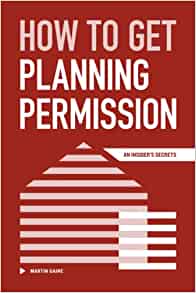

4.6 out of 5 (54 ratings)
Countless property developers throughout history have expressed their frustration that there is no rulebook on how to successfully apply for planning permission – but now there is!
Chartered planning consultant and chief executive of Just Planning, Martin Gaine, presents this superbly accessible guide to one of the most challenging areas of property development: presenting a planning application and getting it approved first time.
The 2021 book offers advice on the following subjects:
- Selecting a designer
- Understanding when permission is required and when it is not (by exploring Permitted Developments)
- Insights into the decisions made by planners
- The application of specialist tactics for the best results every time
- How to respond to permission denial
- Preventing situations that involve enforcement
How To Get Planning Permission: Newbuilds + Extensions + Conversions + Alterations + Appeals
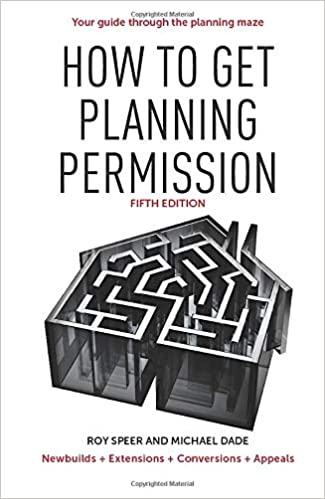

4.4 out of 5 (45 ratings)
A vital, definitive guide to planning permission and how to successfully apply for it has long been missing from the toolkit of the majority of property developers.
However, thanks to the shrewd minds of property specialists Roy Speer and Michael Dade, the 5th edition of How to Get Planning Permission was published in 2016 and offers clear guidance on almost everything there is to know about the subject.
The co-authors cover essential topics in this publication, including:
- Methods to improve the likelihood that your application will be successful
- The best ways to counter objections and reverse refusals
- A clear guide to your rights when it comes to Permitted Developments
- Top techniques to use when appealing a refusal
The Essential Guide to Planning Law: Decision-Making and Practice in the UK
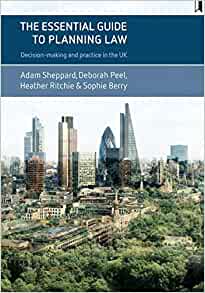

4.7 out of 5 (25 ratings)
Developed and published by leading development and property law specialists Adam Sheppard, Deborah Peel, Heather Richie and Sophie Berry, this book, published in 2017, offers definitive guidance on some complex subject matter.
With an accessibility that renders it ideal for students of real estate business and law as well as the owners of property businesses currently in operation, The Essential Guide to Planning Law offers a clear insight into a perfect marriage between theory and practice.
Whatever their existing level of expertise when it comes to planning law, the publication enables readers to develop a strong grasp of the topic, covering subject matter such as:
- How planning law was and is developed
- The ways in which planning laws function in the “devolved” UK
- Management methods in property development
- The conditions and obligations associated with planning
- How to tackle specialist planning matters
- Enforcement
- How to approach appeals and Judicial Review
The Essential Guide to the use of Land and Buildings under the Planning Acts: including the Use Classes Order
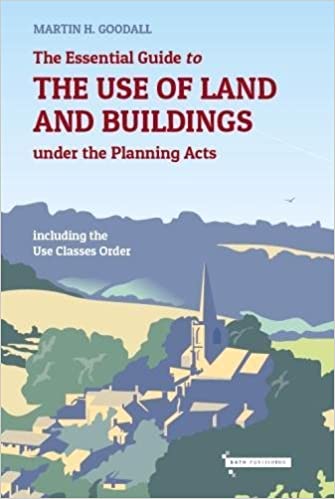

4.7 out of 5 (18 ratings)
First published in 2017 and now updated to reflect changes implemented in 2020, this book – by planning law expert Martin H Goodall – serves as a practical handbook covering use classes and changes of use.
Accessible for all property professionals, whatever the stage of their career, the book provides a vital insight into an area of planning that can at times feel impenetrable.
The contents include clear details on:
- The Use Classes Order
- Permitted Changes of Use
- Unlawful Uses
- Lawful Use Certificates
- Appeals against the refusal of LUC applications
Planning Permission Expertise for Buildings and Extensions: A Step-By-Step Guide by a Chartered Architect Book One - How to Get Started (Pre-Planning Series 1)
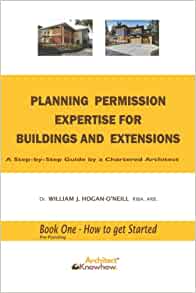

4.7 out of 5 (13 ratings)
Another expertly-realised publication on the subject of planning, this book was published by Dr. William Hogan-O’Neill of RIBA in 2022.
The publication talks readers through the preparation of a submission for planning permission and offers essential guidance on the process of applying for – and being granted – that permission.
Whether you’re applying to develop a single building, an extension, or anything else besides, Hogan-O’Neill’s book constitutes vital reading to help you navigate the process. It will provide you with valuable advice along the way, including:
- Understanding the strengths, weaknesses and potential of your parcel of land or existing property
- Recognising the particular planning considerations that will need to be taken into account for your unique project
- Assembling a strong toolkit in preparation for your application
- Understanding the necessity for architectural value and articulate language to be utilised in your submission
- Developing a working knowledge of the specific areas your local authority is most likely to examine – and how to strengthen your application at those particular points
Chudley and Greeno's Building Construction Handbook
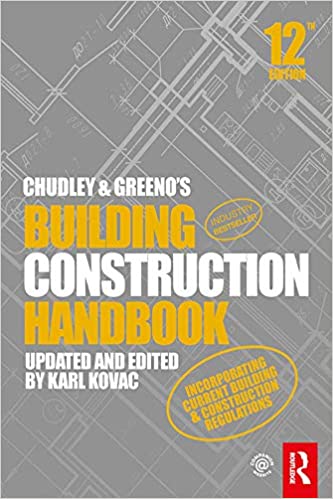

4.7 out of 5 (366 ratings)
From first-year students to experienced professionals, individuals at all stages of their journey within the property industry swear by Chudley and Greeno’s Building Construction Handbook.
For this reason, the publication is now in its 14th edition (as of April 2020) and continues to offer straightforward and transparent guidance on all areas of property development and building.
The contents of this most recent edition covers each area step by step in the following order:
- Pre-construction
- Site investigation
- Site works
- Soil improvement and excavation
- Materials
- Plant
- Foundations
- Basement construction
- Ground supported floors
- Suspended floors
- External walls
- Pitched roofs
- Flat roofs
- Steel framed buildings
- Concrete framed buildings
- Cladding of framed buildings
- Windows and doors
- Ceilings
- Drainage
- Building services
- Insulation and U-values
- Construction defects
Architecture: Form, Space, and Order


4.7 out of 5 (867 ratings)
Another key industry text from highly influential author Francis D.K. Ching, Architecture: Form, Space, and Order is now in its fourth edition.
This updated version from 2014 includes access to an online learning tool – the Interactive Resource Center – which offers tools such as interactive animations, flashcards and photos.
The book itself offers a lucid and accessible introduction to the terminology and concepts of the architecture and construction industry, and covers topics such as:
- Key construction elements
- The core principles of space design
- Specific design areas like light, view, enclosures and openings
- Ways to organise space and plan for circulation
- Working to scale and proportion
Architectural Detailing: Function, Constructibility, Aesthetics
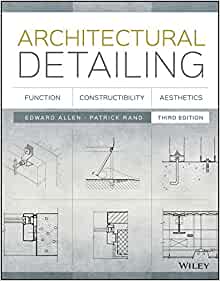

4.5 out of 5 (184 ratings)
Hailed as an “industry standard guide”, this publication by Edward Allen and Patrick Rand – now in its third edition – provides a superbly illustrated insight into the finer points of architectural drawing and planning.
Concise, up to date information is expertly imparted throughout the 2016 book, and readers of all backgrounds can appreciate the skill of its representation of the marriage of art, science and functionality.
The book covers vital subject areas such as:
- Ways to integrate the most effective level of detail into every design
- Materials, construction approaches and methods of assembly – and how to illustrate them
- Sustainable design
- Working to current building regulations
- Aesthetics
- Performance standards
- Future proofing
Spon's Architects' and Builders' Price Book 2023 (Spon's Price Books)
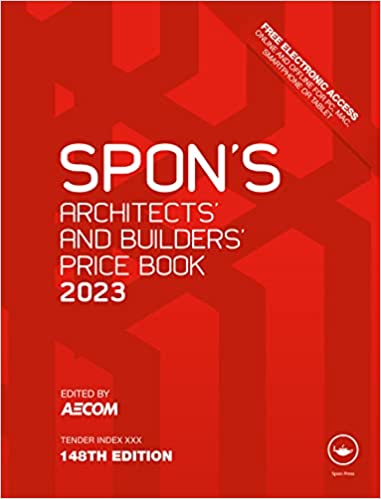

4.5 out of 5 (5 ratings)
The go-to reference book for architects, builders and property developments alike, this publication is vital when it comes to pricing and budgeting for any project.
On its 48th edition by 2023, this endlessly helpful book, compiled by AECOM, is an industry standard text that lays out – as accurately as possible – the current costs involved in developing and constructing almost any building.
Its exhaustive contents cover a wide range of fields, includingL
- An insight into the market as it stands, along with VAT and other taxation rates
- The current cost of labour and worker wages
- Detailed estimates for the prices of a range of equipment and materials
- Expenses associated with measured works
- The cost of various professional services
- Daywork allowances
- Access to resources providing further information
The Complete Guide to Property Development for the Small Investor: How to Identify the Best Opportunities in a Volatile Property Market
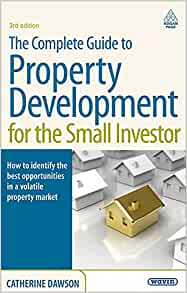

4.1 out of 5 (45 ratings)
First published in 2009 by celebrated property development author Catherine Dawson, this book offers comprehensive guidance and advice that constitutes vital reading for anyone interested in turning a profit in the world of property.
Focusing in particular on property development approaches during times of economic volatility, the publication offers functional checklists and a wide range of resources to support small-scale developers of all backgrounds and experience levels.
Key learning outcomes include:
- Decision-making techniques
- Accessing finance
- Selecting your project
- Planning permission
- Building regulations
- Information on legislation and tax
- Ways to invest in buy-to-let
- Regulations affecting landlords and tenants
John Howard's Inside Guide to Advanced Property Developing & Investing
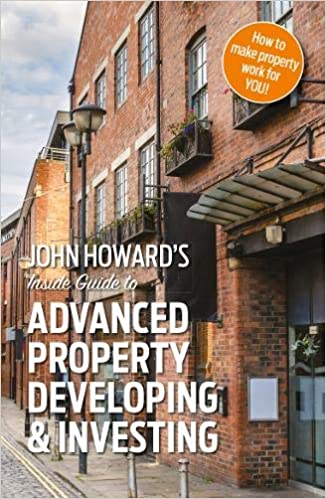

4.4 out of 5 (36 ratings)
Veteran developer and all-round property specialist John Howard shares his extensive knowledge with readers in this no-nonsense, highly practical book – published in 2019.
Known throughout the industry as a seasoned expert, Howard provides actionable guidance and invites new and existing developers to learn from his vast experience in this publication, which includes a wide range of learning outcomes, including:
- How to convert property step-by-step
- A straightforward guide to new builds
- Advice on how to handle listed buildings
- Methods for navigating planning permission
- Handy approaches to land promotion
- Tips on the most practical ways to convert commercial property to residential
- A study on formal and informal tenders
- Ways to trade property
- Most effective methods of growing and scaling a property business
Commercial to Residential Conversions: The essential manual for property developers
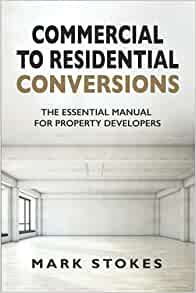

4.6 out of 5 (64 ratings)
This 2018 guide by experienced property developer and entrepreneur Mark Stokes presents industry professionals of all levels of experience with a step by step manual, brimming with practical guidance.
Following the author’s 12 tried and tested principles, the book introduces valuable case studies that come straight from the primary source – Stokes himself and his experiences – and covers a wealth of subject matter, including:
- Prioritising high-performance approaches and outcomes
- Mitigating risk
- Aiming for the best results every time
- Internalising key steps and systems
- Undertaking due diligence
- Security, safety and compliance
- Growing your confidence levels
Industrial To Residential Conversions: The essential guide to converting industrial buildings for profit
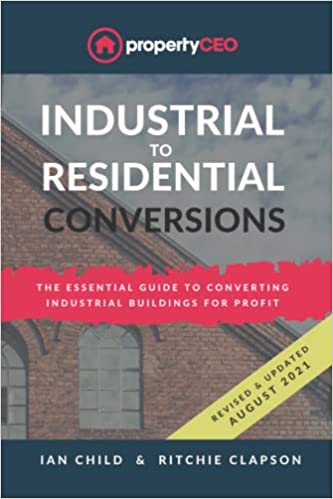

4.6 out of 5 (19 ratings)
This is a particularly useful guide for anyone with an interest in a particularly niche field of property development: conversion from industrial to residential.
This new edition, created in 2021 by Ian Child and Ritchie Clapson, co-founders of Property CEO and hosts of one of the most popular podcasts in the industry: the property CEO podcast, offers specialist insights and reveals handy industry secrets to aid any would-be developer.
Key learning takeaways include:
- Ways to recognise potentially lucrative projects that competitors may miss
- How to get started with little to no experience
- The most effective approaches to building an industry-leading team
- How to effectively fund each and every project
- Approaches to building credibility in the sector
Commercial Property Conversions: How To Profit From Commercial Property Development & Create Property Investment Goldmines (Progressive Property Real Estate Books: Mark Homer & Glenn Delve)
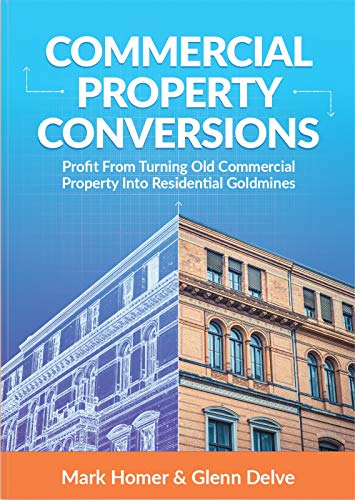

4 out of 5 (1 ratings)
This book provides a ready-made step by step process that allows any reader to source the right property, find the capital for their project, manage the development of commercial premises into residential properties and achieve the best possible returns on an ongoing basis.
Created by leading property developers and investors Mark Homer (also of the Mark My Words podcast) and Glenn Delve and published in 2020, this guide provides resources that allow readers to learn:
- How to turn significant profits from the repurposing and renovation of existing commercial property in just six steps
- The full process of development, with the potential for six-figure returns
- Ways to achieve passive income in both the long term and the immediate future
- How to start immediately
Property Development - Richard Reed
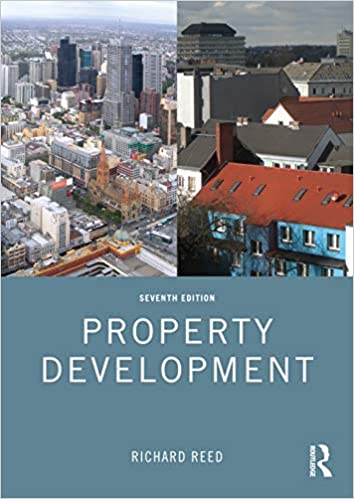

3.9 out of 5 (7 ratings)
The seventh edition of an extremely popular publication that first came into being more than 40 years ago, the current (2021) iteration of Property Development by Richard Reed is fully up to date.
The publication renders this complex subject matter easily accessible for almost any reader, and is ideal for use by students and early or mid-career professionals alike.
The contents of the book take the reader through the process of development step by step, starting with a guide to land that may be developed, and going on to explore:
- Methods of evaluating and appraising potential projects
- Ways to finance a development
- An explanation of the different cycles in effect in the property world
- A guide to planning
- Approaches to construction
- Ways to undertake effective market research
- An insight into the world of PropTech
- How to get the most out of property marketing
- Off-market and private sales
- Ways to develop a property business sustainably
- Emerging markets and how to interact with them
Property Development - Alan Millington
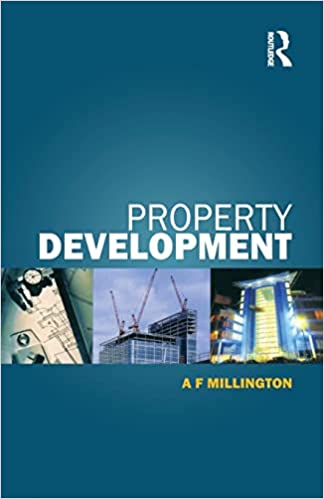

4.4 out of 5 (9 ratings)
A further book by highly experienced property academic Alan Millington, this publication makes a superb companion to his vital work: An Introduction to Property Valuation.
Ideal for students and those seeking a practical knowledge of property development without having to sift through technical jargon and theoretical discussion, the book, published in 2013, offers accessible information on:
- Property development techniques, approaches and considerations
- Financial aspects of development
- An oversight of the construction process
- The social impact of property development
- Planning
- Individual roles within the field of property development
Building The Dream – Property Development success stories
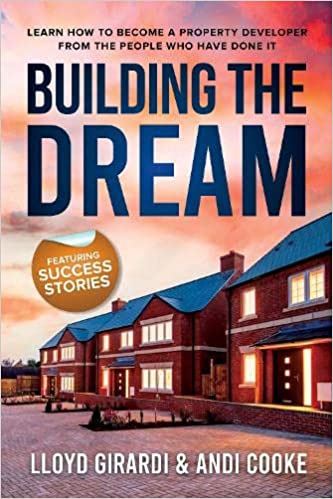

3.5 out of 5 (4 ratings)
Lloyd Girardi and Andi Cooke, both known property developers and investors with extensive experience, published this excellent book in 2022 to share their knowledge with other up and coming industry players.
It promises to share the “realities” of property development – busting its myths and breaking through its veneer of complexity to reveal that the field is truly accessible to anyone and everyone.
Subject matter explored in the publication includes:
- Case studies of real life property specialists
- Ways to get started in property development
- An exploration of the benefits and risks of the practice, and how best to utilise this knowledge
An Introduction to Building and Renovating Houses: Volume 2 Finding Your Ideal Property and Designing Your Dream Home


4.5 out of 5 (7 ratings)
This is the second volume in a series designed to support first time property builders and renovators planning their own personal project.
While the first volume – also by Paul Netscher – covered the hiring and management of builders and contractors and handling the construction process from beginning to end, this second book explains:
- How to find the perfect property or land for your construction project
- The factors to take into consideration when renovating a property
- Various design concepts and considerations
- Ways to improve and upgrade property affordably
- How to manage a construction project
The Building Regulations: Explained and Illustrated
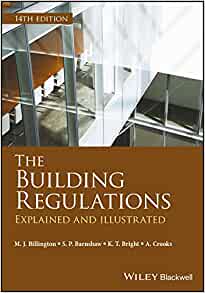

4.6 out of 5 (138 ratings)
The 14th edition of this comprehensive and accessible guide to building regulations features contributions from experts M. J. Billington, S. P. Barnshaw, K. T. Bright and A. Crooks.
This updated version of a long-established publication, first brought to print in 1976, offers verified and authoritative information about all UK building regulations and legal construction requirements. Its contents include:
- An introduction to building control and The Building Act 1984
- Exemptions
- Technical and structural requirements
- Classification of dangerous structures
- Approved documents
- How the regulations should be practically applied
- Local authority powers
- Notice procedures
- Certifications
- Inspections
- Further legislation
Building Regulations in Brief
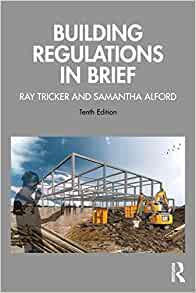

4.5 out of 5 (8 ratings)
Another publication from construction specialist Ray Tricker, again co-authored with built environment expert Samantha Alford, this 2022 book is the tenth edition of a condensed and accessible guide to English and Welsh Building Regulations, planning permission and Approved Documents.
It covers a range of vital details, including:
- Use classes
- Permitted developments
- Planning permission
- Application processes and costs
- A rundown of all building regulations
Building Regulations Pocket Book (Routledge Pocket Books)
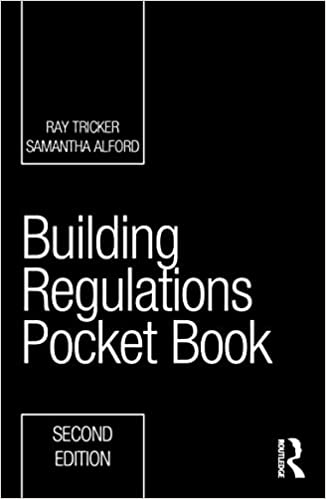

4.1 out of 5 (22 ratings)
From the same Routledge series as the Construction Project Manager’s Pocket Book, included above in this same list, this handy 2022 guide – by Ray Tricker and Samantha Alford – offers an updated insight into all UK Building Regulations and Approved Documents.
Designed as a portable reference to all building regulations and requirements, for use on site or in the office, the book covers all vital areas of responsibility, and includes:
- An overview of the Building Act
- A guide to Planning Permission
- Details relating to Building Regs Approval
- An insight into Approved Documents
- A clear rundown of essential Building Regs requirements
An Introduction to Property Valuation
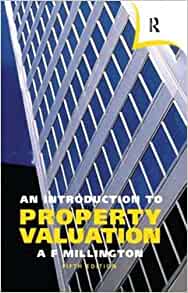

4.1 out of 5 (24 ratings)
This is the fifth edition of Alan Millington’s hugely successful beginner’s guide to the surveying and valuation of property.
Published in 2013, this book provides a valuable and accessible overview of the basics of this discipline, and offers vital insights into the process for anyone interested in a future as a surveyor – as well as countless others keen to grow their knowledge of the field.
The first edition of this book dates back to 1975 – and this new version offers updated learning outcomes for the new generation of values, including information on:
- Land economics
- Quantity surveying
- Law
- Banking and finance
- Property – including investment and development
The Income Approach to Property Valuation
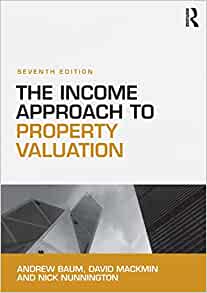

4.1 out of 5 (6 ratings)
This seventh edition publication provides vital guidance for anyone planning to enter the fields of property valuation, surveying and development – and will prove particularly useful for those who need to demonstrate a valuation competence at levels 2 and 3, including RICS students.
Authored by industry authorities Andrew Baum, David Mackmin and Nick Nunnington, this book hit the shelves in 2017 and provides key insights into a range of subjects, bridging the gap between theory and practice.
Readers will learn:
- Approaches for the analysis of market rents, sale prices and market value
- The basics of the “investment method” and its practical applications
- The impact of legal matters on property value
- Most effective valuation methodologies according to today’s market
- The application of spreadsheets, charts and tables in valuation and surveying
Introducing Property Valuation
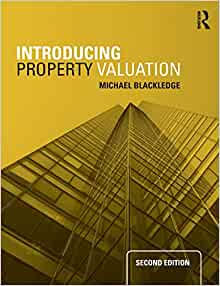

4.1 out of 5 (14 ratings)
This practical and functional guide to property valuation was first published by tutor, surveyor and valuation specialist Michael Blackledge in 2016, and is a detailed and accessible guidebook designed chiefly for students developing their knowledge of the practice.
A no-nonsense introduction to valuation and its related disciplines, this book is a must-read for any future professional planning to enter the world of property.
Key learning outcomes introduced in this publication include:
- The “five traditional methods” of valuation
- Vital guidance and requirements from the International Valuation Standards Council (IVSC) and the Royal Institution of Chartered Surveyors (RICS)
- An overview of matters related to cash flow
- Key calculations
- Illustrative case studies
- Extremely useful further reading suggestions
Real Estate Investment and Finance: Strategies, Structures, Decisions (Wiley Finance)
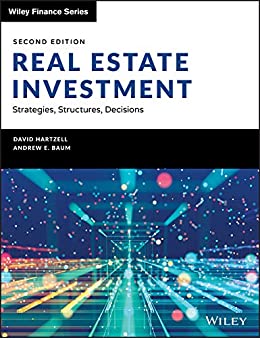

4.6 out of 5 (41 ratings)
This is another very valuable Andrew Baum publication, co-authored with economic and business specialist David Hartzell.
Part of the Wiley Finance series, the second edition of this book was published in 2020, and is used extensively in leading colleges and places of further and higher education.
The publication, along with its companion website, focuses on the wider world of property investment as well as the processes and practices employed by individuals and businesses and covers subject matter including:
- Valuation
- Leasing
- Mortgages
- Funding and underwriting
- Private and public equity
- Performance analysis
- Methods of portfolio building / sale strategies
Residential Property Appraisal: Volume 1 - Valuation and Law
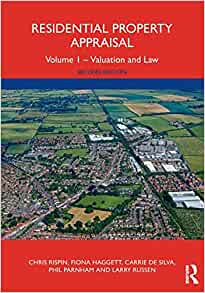

4.6 out of 5 (3 ratings)
This 2021 second edition presents a vital insight into property appraisal techniques and methods in the residential sector, focusing on valuation and the legal aspects of the practice.
Created by leading UK property specialists Chris Rispin, Fiona Haggett, Carrie de Silva, Phil Parnham and Larry Russen, this publication constitutes Volume 1 of a two-book series and offers comprehensive insights into:
- Skills required for property valuation
- Valuation for lending purposes
- Risks and risk mitigation
- Value drivers
- Legal considerations
- RICS regulations
Residential Property Appraisal: Volume 2: Inspections, Defects and Reports
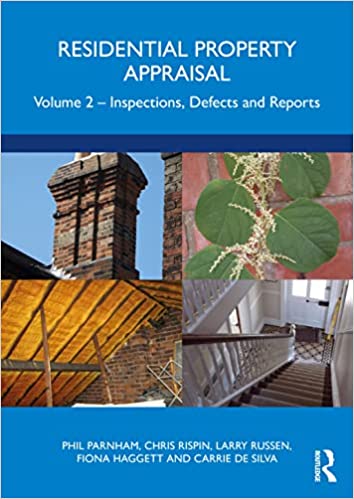

Volume 2 of a two-book series focusing on property appraisal in the residential sector, this updated publication was created by property valuation specialists Phil Parnham and Larry Russen – both of whom also contributed to the first volume.
This second book covers the property inspection process, including an exploration of potential structural and building defects and guidance on how to produce high quality reports.
Readers will learn about the following:
- Practical approaches to surveying
- Inspection techniques
- Common defects
- New challenges
- Safety issues
- New technologies
- RICS Home Survey Standard
- Sustainability and environmental matters
Property Development: Appraisal and Finance: 66 (Building and Surveying Series)
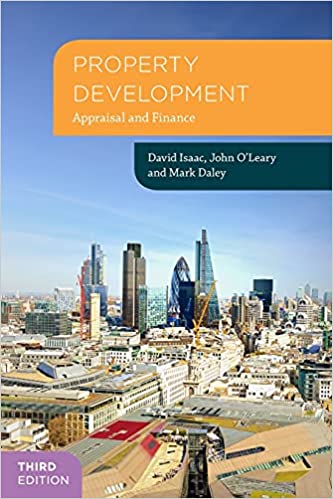

4.6 out of 5 (14 ratings)
Now in its third edition, this vital publication offers clear insights into the full property development process – from planning to construction to the sale or disposal of an asset.
This version of the book, published in 2016 by leading property experts David Isaac, John O’Leary and Mark Daley, is aimed chiefly at students developing their knowledge of the property sector and similar fields.
In reality, however, it offers accessible insights to individuals of any experience level.
The publication covers a huge range of subject matter in an easily digestible and systematic manner, including:
- Risk assessment and mitigation
- Effective planning
- Funding methods
- Best construction practices
- Estate management techniques
- Surveying
- The current property market, its constraints and its possible future
Rethinking the Economics of Land and Housing
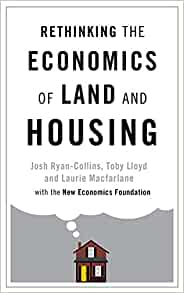

4.4 out of 5 (98 ratings)
Co-authored by Josh Ryan-Collins, Toby Lloyd, Laurie Macfarlane and John Muellbauer in collaboration with the New Economics Foundation (for which Ryan-Collins previously worked as the Senior Economist), this book offers an insightful revision of our approach to the wider financial role of land and housing.
Arguing the case for a renewed examination of land and housing by politicians and economists, the 2017 publication explains how social inequalities, financial crises and housing struggles may be tackled by paying greater consideration to the “land economy”.
Contents include an exploration of:
- Land and its value
- Ownership of land
- Land in production and distribution
- Housing
- Wealth and inequality relating to land
- Potential approaches to financial reform
An Introduction to Building and Renovating Houses: Volume 1. Hiring Contractors, Managing Construction and Finishing Your Home
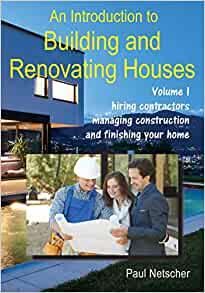

4.3 out of 5 (20 ratings)
Volume 1 of a handy series aimed at homeowners wishing to improve, renovate or construct their own property, this book – written in 2019 by construction and project management specialist Paul Netscher – contains valuable insights into the entire process.
Designed to be accessible by absolute beginners, with easily digestible and actionable guidance throughout, the publication offers tips on:
- The various roles involved in a project
- Different project management techniques and approaches
- The processes and practices involved in property renovation and construction
- How to choose a contractor
- Approaches to personnel management
- Your rights and duties as a project manager
- The potential issues and pitfalls that may arise during construction or renovation
- Contracts and finances
Beginner's Guide to Eco Renovation: Understand the Basics and the Best Questions to Ask


4.6 out of 5 (8 ratings)
Professional and personal development author Judith Leary-Joyce created this practical 2022 guide to sustainable renovation following the retrofitting of her own property.
Working closely with experts in the field, she produced this engaging and accessible publication to help others who wish to redesign their property without negatively impacting the environment.
Ideal for absolute beginners, the book covers a range of vital subject matter, including:
- Translations of building terminology and jargon
- A breakdown of the available energy-efficient elements for use in construction
- Insights into the planning process
- A study of insulation types
- Airtightness and ventilation
- Waste management
Building Surveyor’s Pocket Book
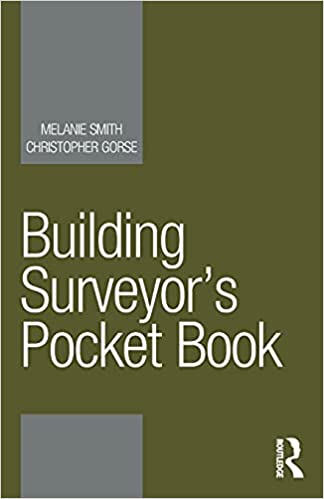

4.3 out of 5 (53 ratings)
This is another excellent addition to the Routledge Pocket Book series and was written by Melanie Smith and Christopher Gorse in 2021.
Designed to provide concise, practical access to the basics of surveying to students and professionals of any level and background, the publication explores a comprehensive selection of principles that are applicable internationally, including:
- Building pathology
- Form and construction
- Building performance
- Legal frameworks and regulations
- Building forensics
- Refurbishing and retrofitting
- Energy performance
- Health and safety
- Environmental concerns and sustainability
Building Surveys and Reports
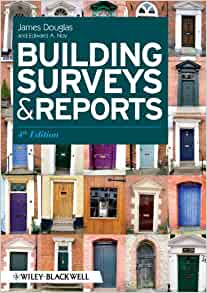

4.4 out of 5 (16 ratings)
A 4th edition publication by James Douglas and Edward A. Noy, this 2011 book presents a detailed overview of methods for surveying buildings fabricated from both contemporary and traditional building materials.
All kinds of construction techniques and approaches are explored, as are potential issues that may arise. The contents of the book provide a clear and accessible insight in to vital subject matter, including:
- Building materials and techniques
- Potential issues arising from renovation and alteration work
- The potential effects of fire damage and flooding
- Legal matters
- Common problems and how to handle them
Building Pathology: Principles and Practice
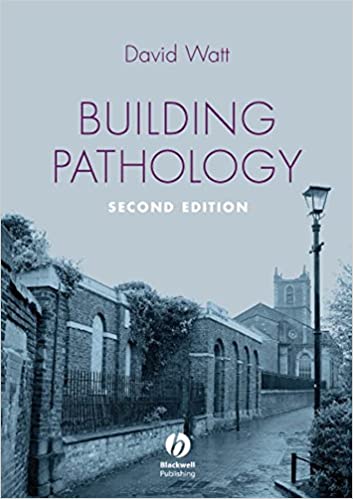

4.7 out of 5 (29 ratings)
Expert building surveyor David Watt published this second edition of his detailed and insightful guide in 2007.
The book focuses on diagnostic and remedial matters relating to performance issues and defects in structures, offering superb guidance for any construction and renovation specialist.
Chiefly applying a “holistic” approach, Watt pays particular attention to a building’s materials and structure, and the way it interacts with – and exists within – its surrounding environment. Learning outcomes include:
- Building classification
- Building requirements and performance
- Defect diagnosis
- Remediation planning and techniques
- A summary and analysis of materials used in building
- A study of damage, defects and wear and tear in buildings
- Techniques for surveying and assessing buildings
- Remediation approaches
- Aftercare
- Building management techniques
Understanding Housing Defects
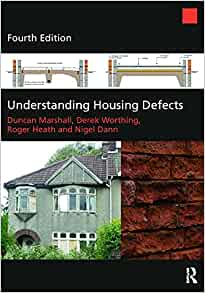

4.8 out of 5 (84 ratings)
A fourth edition publication created by co-authors Duncan Marshall, Derek Worthing, Roger Heath and Nigel Dann, the most recent version of Understanding Housing Defects was brought to print in 2013.
It’s clear, accessible and illustrated by superb photographs to aid in the reader’s effective understanding of its contents.
The subject matter presented in this book includes:
- Defect definitions
- The history of construction and architecture
- Techniques for investigating defects
- Structural movement and its causes and mitigation
- Floors
- Roofs
- Walls (external and internal)
- Plastering and rendering
- Internal and external joinery
- Pests, wear and tear
- Damp
- Defects that impact health and the environment
- Plumbing, heating and drainage
BCIS Comprehensive Building Price Book 2023
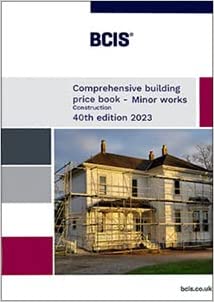

This is another endlessly valuable official publication, this time compiled by BCIS. Spread across two volumes, the Comprehensive Building Price Book details the carefully estimated expenses that a property developer should factor into their budget during current times.
Focusing on the separate areas of major works and minor works, this book, published by RICS in 2022, lays out industry standard costings to make costing a project as easy and accurate as possible.
This 40th edition includes updated detail, and features new additions such as the costs of:
- Straw bale masonry
- Kiln dried C24 timber
- Air source heat pumps
- Electrical vehicle charging points
- Specialist organic paints
- Permeable block paving
BCIS Alterations and Refurbishment Price Book 2023 28th Edition
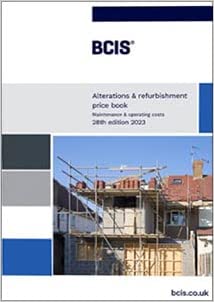

This is a companion publication to the above book, from BCIS, and includes industry standard price estimates for alteration and refurbishment projects.
With a focus on projects that are small to medium in size, this publication is in its 28th edition and, similarly to its partner above, features updates for 2023 which include:
- Permeable block paving
- Specialist organic paints
- Electrical vehicle charging points
- Air source heat pumps
- Kiln dried C24 timber
- Straw bale masonry
Building Surveys
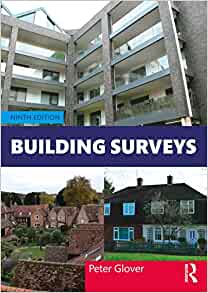

Veteran chartered surveyor Peter Glover’s trusted and authoritative guide, Building Surveys, is now in its ninth edition and has been brought up to date in this comprehensive 2022 version.
Covering extensive material in a highly accessible manner that is suited to both students in the field of construction and working professionals, the book features detailed illustrations and guides readers through a wealth of material, including:
- Required knowledge
- Vital equipment for surveying
- Key procedures
- Report-writing
- Modern methods of construction
- Up to date materials lists
- Aspects of construction, including the different components of a building
- Potential issues and problems
- Legal considerations
Building Your Future: A step by step guide to building a £1million+ construction business
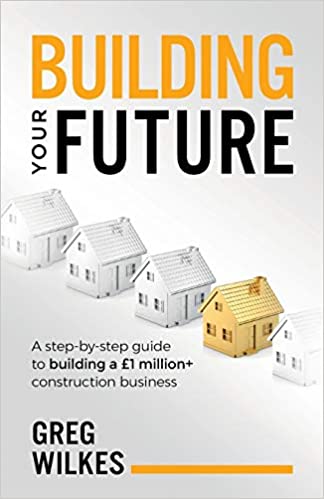

4.6 out of 5 (51 ratings)
Entrepreneur Greg Wilkes takes readers step by step – from kicking off their development business to full financial freedom – in this excellent 2019 publication.
Designed for readers who long to leave behind their waged employment and build a property empire that supports their ambitions, the book offers a highly practical approach to property developing, with guidance that includes:
- How to build your profits as you grow your portfolio
- Ways to run your business as smoothly as possible
- Selecting the best possible sub-contractors
- Scaling up your business easily
- Reducing stress while pursuing success
Construction UK: Introduction to the Industry
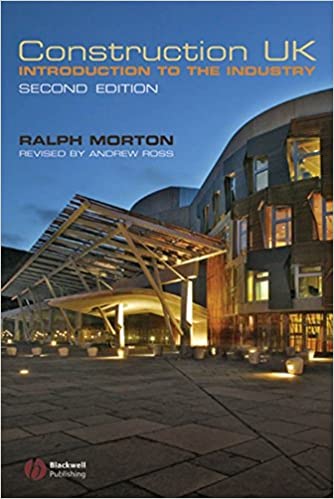

3.9 out of 5 (11 ratings)
As the name of this publication suggests, it is intended for those new to the construction sector such as students and future professionals.
However, it contains handy advice and vital guidance from which almost any operative within the industry may benefit. Created by construction expert Ralph Morton and revised by Andrew Ross, this is the second edition of this popular 2007 book.
The book features:
- A handy background to the construction industry
- An overview of ongoing challenges and pitfalls in the sector
- A study of demand for construction
- Industry profiles
- An insight into the standard workforce and its changing trends
- Introductions to professional and managerial roles
- An exploration into the world of contracting
- A study of the procurement process and contracts
- Methods of building production
- A look at the environmental impact of construction
- Insights into the government’s approach to construction and the way the building industry functions
Construction Management: Theory and Practice
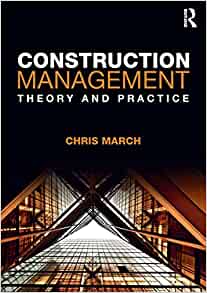

4.5 out of 5 (7 ratings)
Chris March, a specialist in construction theory and practice, developed this 2017 book as an academic guide for any up and coming construction manager. In particular, the publication is aimed at students working towards a qualification in this field.
Thanks to the broad reach of the topics discussed, the book is applicable to a wide range of relevant courses. Subject matter covered in this book includes:
- The various roles in construction and their relationship to the Construction Manager
- The theory of construction management
- Good leadership practices
- Approaches to team work
- Financial matters, including the sourcing of capital
- Monetary estimation and costings
- Tendering and bidding
- Procurement
- Contract types
- Operations management
- Supply chains
- Health and safety
- Waste management
- Environmental responsibilities
- Marketing
- The future of the construction industry
Construction Project Manager’s Pocket Book (Routledge Pocket Books)
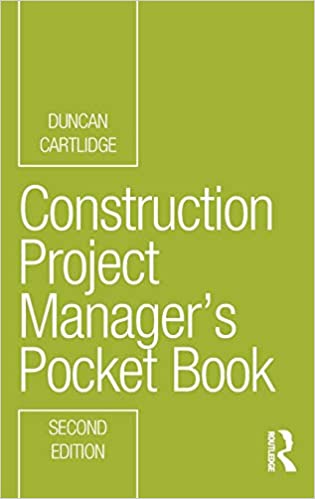

4.6 out of 5 (97 ratings)
Created by expert chartered surveyor Duncan Cartlidge, this is a practical guide to the tasks, duties and vital knowledge applicable to the position of construction project manager – presented in a concise and easy-to follow reference book.
Now in its updated second edition, published in 2020, the book provides information and guidance on the following subjects:
- Leadership approaches
- Technical details
- Current required documentation
- Procurement trends and potential issues
- BIM technologies
- Up to date CDM regulations
- Communication techniques
- Team building and dynamics
- Ethics
Construction Daily Site Log Book | Work Activity Report Diary: Record Dates, Conditions, Equipment, Contractors, Signatures, etc.
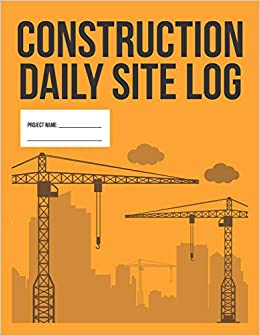

4.4 out of 5 (32 ratings)
A highly practical and functional resource designed to be used on site by any foreperson, the pages of this log book have been produced to be attached to a clipboard.
Pictures taken of the completed pages will also be compatible with an Electronic Document Management System (EDMS).
Paperwork of this kind is vital for any construction or development project to ensure proper practice and record-keeping. This 2019 publication includes industry standard details such as:
- Dates and project numbers
- Foreperson names
- Contractor names and trades
- Weather
- Site visitors
- Schedule of work
- Issues and problems such as delays and safety matters
- Accidents and incidents
- Work completed
- Hours worked
- Equipment and materials used
- Further notes
- Space for foreperson signature
Construction Site Record Book: Daily Activity Log Book | Jobsite Project Management Report, Site Book | Log Subcontractors, Equipment, Safety Concerns ... Labourer Notebook Diary: Volume 4 (Building)
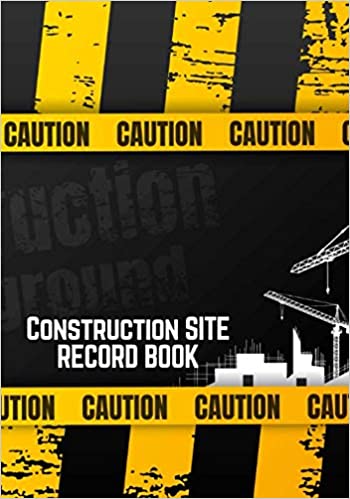

4.1 out of 5 (25 ratings)
Produced by Signature Planner Journals, this is another extremely handy and immediately applicable tool for site managers and fore people to use to keep records of project-related activities.
100 pages long, the workbook is durably designed and intended for use on site. It contains a comprehensive site safety checklist, as well as space to record:
- Contract Numbers
- Specific project details
- Schedules
- Conditions (including weather, ground etc.)
- Matters discussed at safety meetings
- Health and safety issues, including an accident log
- Visitor information
- Summary of completed works
- Hours worked
- Equipment and material deliveries and usage
Construction Economics: A New Approach
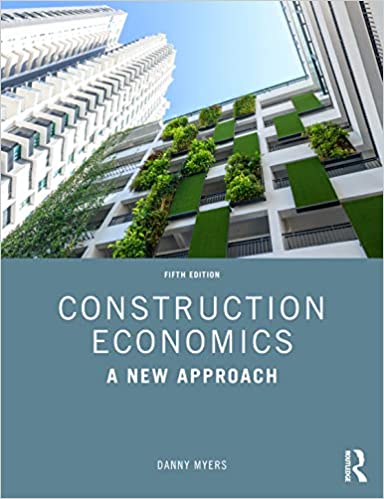

5 out of 5 (1 ratings)
The 2022 edition of this hugely enlightening guide provides vital economic context to the world of property development as we move forward within an ever-more turbulent system.
The book, written by construction and property academic Danny Myers, fills an important gap between the world of finance theory and the practical aspects of property development.
Readers will gain valuable insight into the following topics:
- The “construction life cycle”
- The fallout of the 2019 Coronavirus pandemic on property
- Technological advances within the property industry
- Energy efficiency and recycling
- The practice of retrofitting
WJEC Vocational Award Constructing the Built Environment Level 1/2
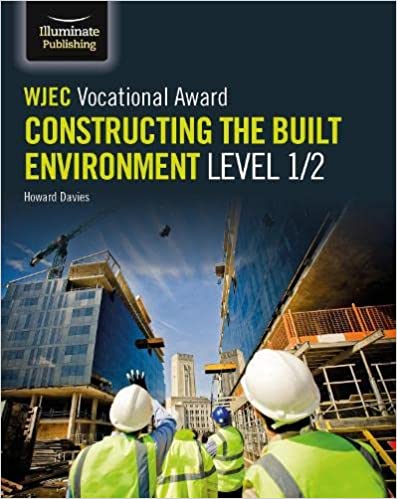

4.1 out of 5 (26 ratings)
A companion textbook to the WJEC Vocational Award in Constructing the Built Environment, this 2019 publication by Howard Davies and Steve Jones is aimed at students studying for either Level 1 or Level 2 of this qualification.
However, its contents will prove valuable for any beginner in the field.
Using accessible and practical language, readers will be guided through their course step by step, with the book’s dedicated assessment section serving to prepare them for exams and tests of knowledge.
Collins Complete Plumbing and Central Heating


4.4 out of 5 (468 ratings)
In this 2010 guide, DIY experts Albert Jackson and David Day offer expert advice and practical insights into the installation, maintenance and functionality of the plumbing and central heating elements found within any property.
Aimed chiefly at homeowners looking to gain a working understanding of these specialists components of their property, the book offers clear and accessible information about:
- Undertaking urgent repairs
- The inner workings, installation and repair of kitchen appliances, sinks, taps, showers, baths, toilets and more
- Radiators, boilers and other heating elements – and how they work
- Ways to diagnose faults and resolve them
- Key safety advice
- A list of the most effective tools and equipment
The Damp House: A Guide to the Causes and Treatment of Dampness
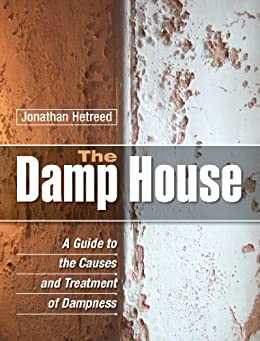

4.5 out of 5 (168 ratings)
This book by director of Hetreed Ross Architects, building designer and construction expert Jonathan Hetreed introduces readers to the causes, mitigation approaches and possible resolutions of damp problems within various structures.
With the help of clear photographic illustrations, the 2012 publication is a comprehensive guide on how to identify and tackle all kinds of damp. It contains vital subject matter such as:
- Rising damp
- Penetrating damp
- Condensation
- Leaks
- Examines damp in roofs, walls, ceilings and floors
- The effects of living with damp, and how to resolve them
Practical Guide to Diagnosing Structural Movement in Buildings
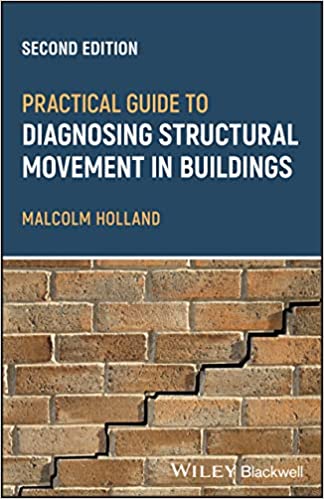

4.7 out of 5 (140 ratings)
Created by experienced chartered surveyor Malcolm Holland, this book covers common problems associated with building movement, subsidence and similar issues, and provides accessible advice and suggestions on how to remedy these problems.
Now in its 2ns edition, updated for 2023, this publication is vital reading for anyone interested in the causes of cracks in buildings – from homeowners to property developers and renovation specialists.
Learning outcomes include:
- An understanding of crack patterns and what they may mean
- A study of types of movement
- Insights into load distribution and overloading
- A guide to cavity wall ties and their part in structural movement
- An introduction to potential issues with foundations and drains
- A rundown of potential remedial approaches, such as stitching, underpinning and more
Old House Handbook: A Practical Guide to Care and Repair
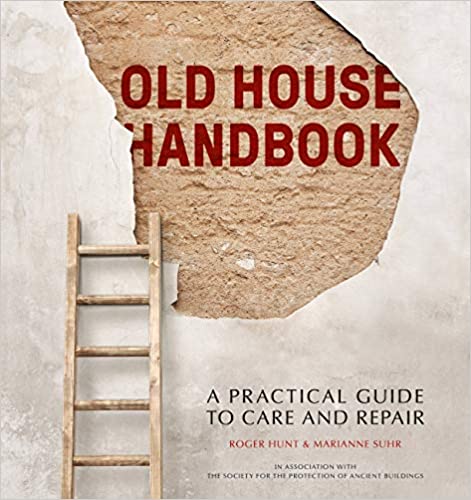

4.6 out of 5 (237 ratings)
This publication is a vital resource for the owner of any “old” property – including structures dating back as far as mediaeval times or as recently as the Victorian and Edwardian eras.
Approved and authorised by the Society for the Protection of Ancient Buildings, the book was written in 2008 by Roger Hunt and Marianne Suhr and offers useful and practical advice to aid homeowners in the sensitive, respectful and compliant maintenance of their property.
Key learning outcomes include:
- A guide on how to inspect and analyse an older property
- Managing breathability and issues related to damp
- Maintaining all elements of a property, including roofs, walls, floors, timber components, fireplaces and chimneys, windows and doors, plaster, finishes and services
- Handling structural movement
- Future-proofing and managing problem property issues
Technical Due Diligence and Building Surveying for Commercial Property
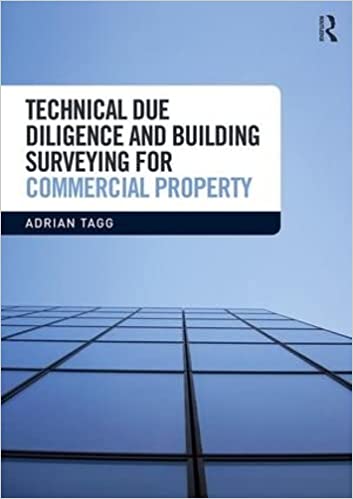

4.8 out of 5 (11 ratings)
Published in 2018, this book is presented as the first of its kind to exclusively focus on “TDD” (Technical Due Diligence).
It examines the work and duties of building surveyors in the field of commercial property, offering a step by step guide to inspections, reports and potential issues that these examinations may reveal.
Written by Construction Management academic Adrian Tagg, this book offers a range of learning outcomes, including:
- An overview of the surveying process
- How contracts work
- The various commercial sectors that may use surveyors
- Approaches to the inspection of roofs, structures, facades, finishes and services
- Details on how to survey external areas
- A guide to relevant legal and technical matters
A Practical Guide to Planning, Highways and Development
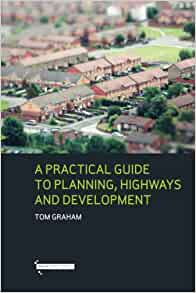

5 out of 5 (4 ratings)
This book, written by Tom Graham in 2019, offers clear information and guidance on a subject that many would-be developers – and even working professionals – tend to find intimidating and overly complex.
A good grasp of the legalities and practicalities associated with highways in the sphere of planning and development is vital for the effective application of many projects. However, a lack of understanding regarding this subject can result in major unforeseen stumbling blocks.
Graham’s book presents vital information in a lucid and uncomplicated manner, accessible to almost any reader. The publication’s subject matter includes topics such as:
- Highway law
- Conditions, planning agreements and other planning matters involving highways
- National policy and its effect on development proposals
- Guidance on technical matters
- Methods to propose development plans
- Section 38 and Section 278 Agreements
Disclaimer
Please note that Property Solvers Auctions recommendations in this post are not direct endorsements of the individuals or any associated companies behind these podcasts (with whom we have no affiliation, financial or otherwise).
In an age where property investment scams are rife, we strongly recommend undertaking comprehensive due diligence on courses, mentorship programmes, crowdfunding initiatives or other offerings.
We also strongly suggest speaking with a qualified accountant with demonstrable experience of working in the property industry.



